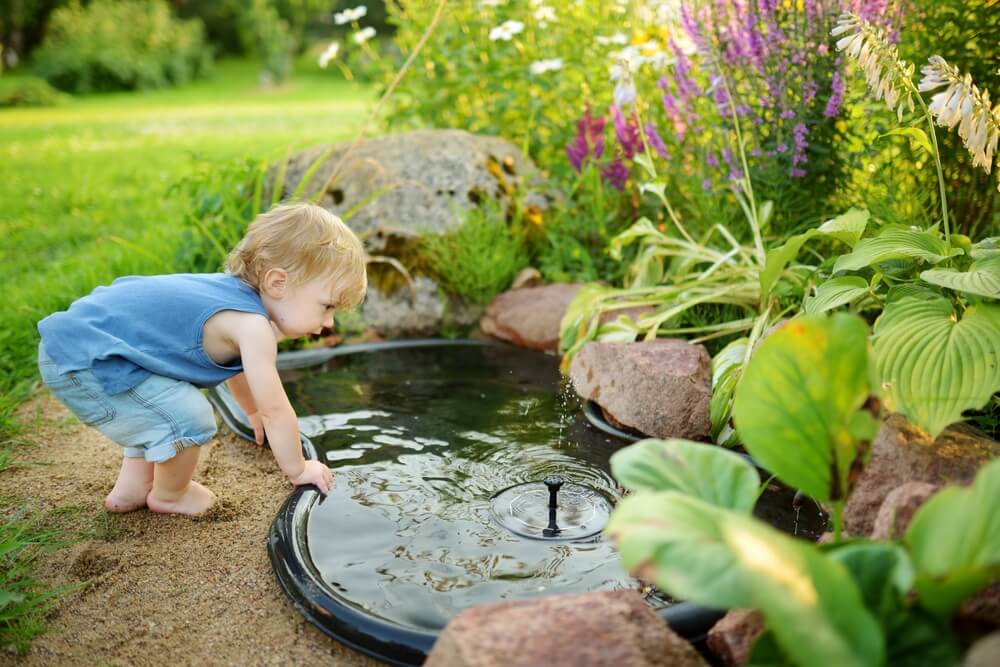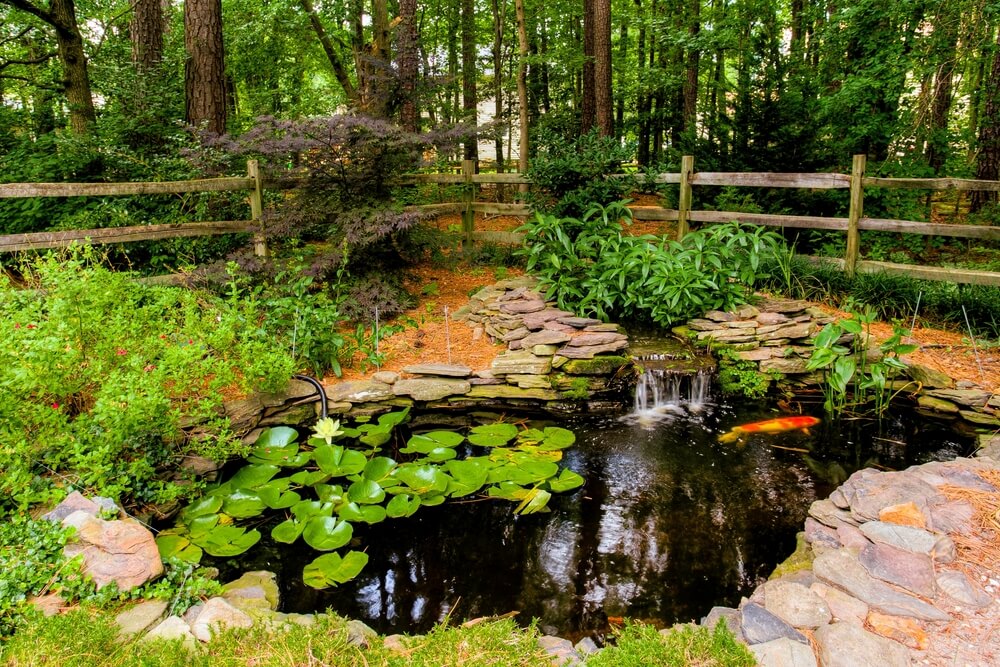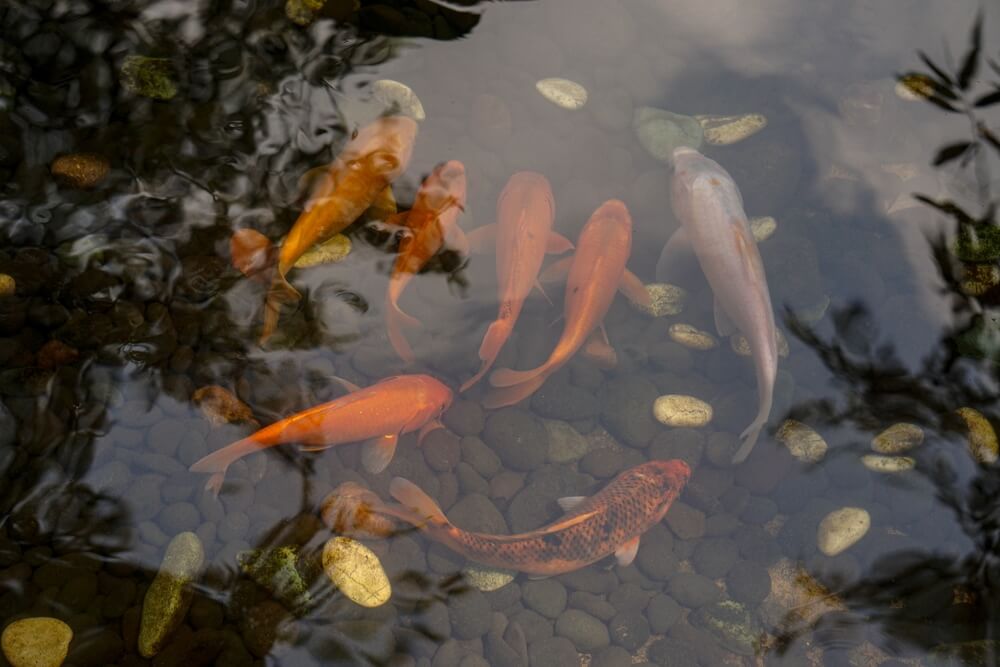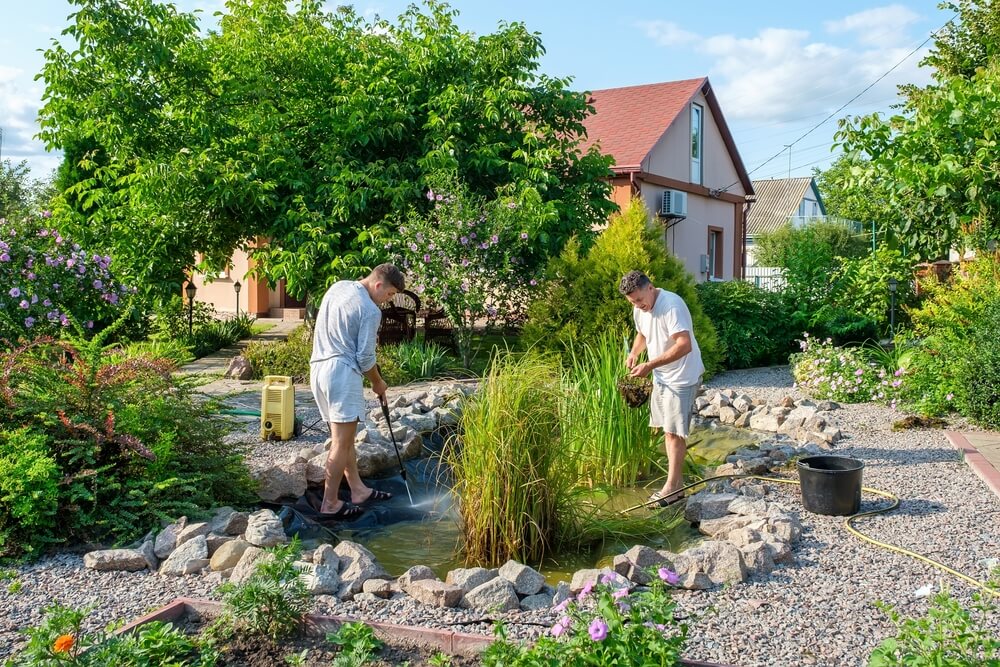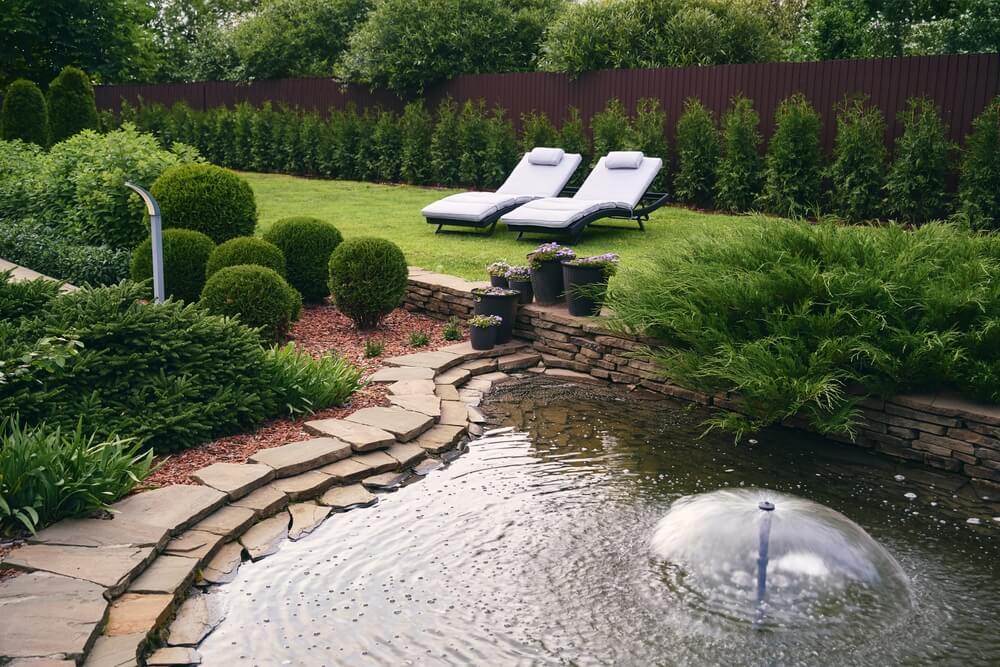If you’ve been dreaming about turning your outdoor space into a peaceful oasis, adding a backyard pond is a great idea. Not only does a backyard water feature bring a sense of tranquility, but the right kind of fish can also help maintain the ecosystem by controlling mosquito larvae and promoting healthy pond water.
But what are the best fish to choose for small ponds?
Best Types of Fish for a Small Backyard Pond
For pond owners with smaller fish ponds, it’s important to find species of fish that can thrive in smaller spaces with lower water temperatures or even warmer climates.
Whether you’re starting with a koi pond, adding aquatic plants like water lilies, or considering different types of fish like fancy goldfish or fathead minnows, you want to ensure the pond depth, oxygen levels, and water chemistry are all just right.
In this guide, we’ll dive (pun intended) into the best pond fish options for small ponds, covering colorful fish like butterfly koi, hardy choices such as golden orfes, and even natural mosquito controllers like mosquito fish.
Whether you’re in temperate climates or enjoying warmer water, we’ve got the best way to fill your fish pond with the perfect species of fish to create a thriving, beautiful backyard pond.
Factors to Consider When Choosing Fish for a Small Backyard Pond
When deciding which fish to add to your backyard pond, there are a few key things to keep in mind. Here’s a quick breakdown of what to consider:
Pond Size and Depth
The size of your pond plays a big role in which fish will do well. Small ponds have fewer gallons of water, so it’s important to choose smaller fish that won’t outgrow the space. Larger ponds can handle bigger fish, but you’ll need to make sure the pond is deep enough to accommodate them.
Water Temperatures and Climate
Water temperatures matter a lot. Some fish, like koi and fancy goldfish, prefer warmer water, making them a better choice for warmer climates. On the other hand, species like brook trout and yellow perch thrive in cooler waters. Before picking your fish, check the climate in your area and the water source to find the right match.
Oxygen Levels and Water Quality
Oxygen levels are crucial for the health of your fish. Some fish, like algae eaters, can do well in ponds with lower oxygen levels. Others need more oxygen and cleaner water. Adding a water pump is a good way to keep the water moving and maintain healthy oxygen levels for your fish.
Fish Compatibility
Make sure to choose fish that will get along with one another. Peaceful fish like goldfish and white clouds are great for small ponds because they coexist well with other species. Larger fish, such as largemouth bass or channel catfish, might need more space or deeper water, so they don’t overwhelm the pond or other fish.
By keeping these factors in mind, you’ll create the right environment for your fish to thrive in your backyard pond.
Top Fish to Consider for a Small Backyard Pond
Now that you know what to consider, let’s dive into the best fish options for small backyard ponds. These species are known for their ability to thrive in small ponds and create a balanced ecosystem.
Goldfish (Comet Goldfish, Fancy Goldfish, Black Moors)
Goldfish are one of the most popular choices for small ponds. They come in various types, such as comet goldfish, fancy goldfish, and black moors. They’re small, colorful fish that are easy to care for and can handle a range of water temperatures.
Plus, they’re peaceful and get along with other fish, making them a great addition to your pond.
Mosquito Fish (Gambusia)
If you’re looking for a low-maintenance fish that helps with pest control, mosquito fish are a good option. These small fish are known for eating mosquito larvae, helping to keep your backyard pond free from unwanted insects. They are hardy, thrive in warm water, and require very little care, which makes them a practical choice.
Koi (Butterfly Koi, Domestic Koi)
Koi are stunning fish that can grow to be quite large, so they’re best for medium to larger small ponds. Butterfly koi, known for their graceful fins, and domestic koi are both great options if you have the pond depth and filtration to support them. They’re a bit more demanding in terms of maintenance but can add beauty and color to your pond.
Minnows (Rosy Red Minnows, Fathead Minnows)
Minnows, especially rosy red minnows, and fathead minnows, are great for small ponds. These fish are small, hardy, and can adapt well to various pond conditions, including cooler water temperatures. They’re easy to care for and can coexist with other species, making them a peaceful addition to your pond.
Guppies and White Cloud Mountain Minnows
Guppies and white clouds are colorful fish that do well in small ponds with warm water. They’re small, vibrant, and can quickly liven up your pond with their playful swimming patterns. These fish are easy to care for but are more sensitive to cold temperatures, so they’re better suited for ponds in warmer climates.
By choosing the right mix of small and hardy fish, you can create a balanced and visually appealing pond. Each of these fish species brings something unique to your backyard pond, whether it’s beauty, pest control, or low maintenance.
Where to Find the Best Fish for Your Backyard Pond
Once you’ve decided on the best types of fish for your backyard pond, the next step is finding a reliable source to purchase them. Here are a few options to help you get started.
Local Pet Stores and Garden Centers
One of the most convenient places to find fish for your pond is a local pet store or garden center. Many pet stores have sections dedicated to pond fish, especially goldfish, koi, and other small fish suitable for outdoor ponds.
Garden centers that specialize in water gardens often carry pond fish as well. These stores are great for getting fish that are already adapted to your local climate.
Online Fish Retailers
If you’re looking for more variety or can’t find the right fish locally, online fish retailers are a great option. Many specialized websites offer different types of fish, including exotic goldfish, koi, and mosquito fish.
Be sure to choose a reputable seller that guarantees live delivery. Keep in mind that when ordering online, fish may arrive in plastic bags and need time to adjust to their new environment.
Pond and Aquatic Stores
Some stores specifically cater to pond owners and water gardens. These stores often offer a wide selection of pond fish and supplies, like water pumps and aquatic plants. They are also a great resource for advice on pond maintenance and choosing the right fish for your setup.
Fish Farms and Hatcheries
If you’re looking to stock a larger pond or want native fish species, consider contacting a local fish farm or hatchery. These places often sell fish like trout, bass, and catfish that are suited for larger ponds and farm ponds. Buying directly from a hatchery can also ensure you get fish that are well-suited to your region’s water temperatures and conditions.
Local Fish Clubs or Pond Societies
Another option is to connect with local fish clubs or pond societies. These groups often have members who breed and sell fish or can recommend trusted sellers. Plus, they’re a great source of information on pond care and fish health.
By exploring these options, you can find the right fish to fit your outdoor pond.
Tips for Maintaining a Healthy Backyard Pond
Once you’ve chosen the best fish for your small backyard pond, it’s important to maintain a healthy environment for them to thrive. Here are some key tips to keep your pond clean and your fish happy.
Water Filtration and Oxygenation
A proper filtration system is crucial for keeping your pond water clean and free from debris. Filtration helps remove excess waste from the fish and keeps algae growth under control.
Along with filtration, a water pump can help maintain good oxygen levels by circulating the water. This is especially important if you have fish that need well-oxygenated water, like koi or goldfish.
Feeding Your Fish
Feeding your fish may seem simple, but there are some important things to remember. Overfeeding can lead to poor water quality, as uneaten food will decompose and cause excessive algae growth.
Stick to feeding your fish small amounts once or twice a day, and only feed them what they can eat within a few minutes. This helps maintain clean water and keeps your fish healthy.
Adding Aquatic Plants
Aquatic plants, such as water lilies, not only beautify your pond but also help maintain a balanced ecosystem. They provide shade, which helps keep the water cooler and offers natural hiding spots for your fish.
Plants also help improve water quality by absorbing excess nutrients that would otherwise encourage algae growth. Just make sure to choose plants that thrive in the same water conditions as your fish.
Seasonal Care
Depending on where you live, your pond may need some extra care during different seasons. In warmer climates, keeping the water temperature down during hot months is important. In colder climates, make sure your fish can survive in cooler waters. You might need to add a pond heater or bring more sensitive fish, like guppies, indoors during the winter. For cold-hardy fish like koi or goldfish, they’ll be fine staying in the pond year-round as long as the pond is deep enough.
Regular Pond Maintenance
A little routine maintenance can go a long way in keeping your pond in top shape. Skim leaves and debris from the surface regularly, check your filtration system, and monitor water levels, especially during dry spells. Keeping an eye on the water chemistry is also important, so test the water regularly to ensure pH and oxygen levels are in the right range for your fish species.
By following these tips, your fish pond will remain a healthy, beautiful feature in your backyard for years to come.
Creating a Thriving Backyard Pond
Building and maintaining a small backyard pond can be a rewarding experience, especially when you’ve chosen the right fish and followed the steps to keep everything balanced.
With proper care, you’ll create a vibrant, healthy ecosystem right in your backyard.
Enjoy the beauty and tranquility of your fish pond, and watch as your backyard transforms into a relaxing haven for both you and your fish.
